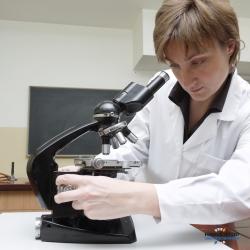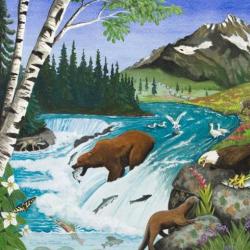Profession biologist. What does biology study? Who is a biologist
Every person dreams of choosing a profession that would not only always be in demand, and therefore highly paid, but also benefit society. One of these professions is undoubtedly the profession of a biologist. It is these specialists who study everything related to living organisms on our planet. Our health, development and future largely depend on their professionalism. Therefore, it is not surprising that the biologist profession is the second most popular in the world.
Every person dreams of choosing a profession that would not only always be in demand, and therefore highly paid, but also benefit society. One of these professions is undoubtedly biologist profession. It is these specialists who study everything related to living organisms on our planet. Our health, development and future largely depend on their professionalism. Therefore, it is not surprising that the biologist profession is the second most popular in the world.
True, unfortunately, not everyone can obtain this necessary and promising profession, since it puts forward a number of requirements that only people with certain inclinations and character can meet. But what is the peculiarity of this profession, you will learn from our article.
Who is a biologist?

From Greek biology translated as “science of life” (bios – life, logos – science). Accordingly, the name of the profession of a biologist indicates that he is a specialist who studies aspects of life of all living organisms on planet Earth. That is, his close attention is drawn to the origin, evolution, growth and development of living organisms, regardless of whether it is a microbe, a plant or an animal.
Biology was officially identified as an independent branch of science only in the 19th century. However, its formation dates back to even more ancient times. It is known that already the great Aristotle in the 4th century BC. made the first attempts to organize information about nature, highlighting four stages in it: people, animals, plants, and the inorganic world.
Today, the profession of a biologist unites specialists of various specializations, each of whom studies only a certain class of representatives of living organisms. For example, anatomists and physiologists study the structure and features of human life, zoologists specialize in the anatomy and physiology of animals, and a botanist studies the plant world. And this is not a complete list of the specialization of a biologist. There are also such modern areas as genetics, microbiology, biotechnology, embryology, selection, biophysics, biochemistry, virology, etc.
But in any case, no matter what specialization you choose biologist, his responsibilities are almost completely identical. The responsibilities of any biologist include: studying, systematizing, researching the general properties and patterns of development of a particular group of living organisms, conducting research in laboratory conditions, analyzing the results obtained and issuing practical recommendations for improving conditions within the framework of his specialization, etc.
What personal qualities should a biologist have?

It is not difficult to guess that a biologist, first of all, must love nature and be interested in the emergence and development of life on Earth. In addition, a real biologist is different:
- analytical and logical way of thinking;
- curiosity and patience;
- accuracy and attentiveness;
- observation and rich imagination;
- well-developed figurative visual memory;
- perseverance and ability to concentrate;
- responsibility and honesty.
It should be noted that since biologist's work involves participation in laboratory studies in which various chemicals are often used; the specialist should not be prone to allergies.
Advantages of being a biologist
As mentioned above, biology is an actively developing branch of science, opening up enormous prospects for specialists for career growth and self-realization. Another undoubted advantage of the biologist profession is its demand. According to labor market experts, this profession in the coming years may become one of the most in demand and highly paid.
An important advantage of this profession is also the wide variety of institutions and organizations in which you can demonstrate your talent and professional skills. Today, biologists are gladly hired in laboratories at research institutes, environmental organizations, nature reserves, botanical and ecological gardens, research institutes, environmental organizations, agricultural sectors and education (schools, colleges, universities).
Disadvantages of being a biologist

Despite the fact that biology is one of the most popular branches of science in the world, in Russia this field of activity is still in its infancy, so the salaries of biologists are low. Especially if they work in government agencies (for example, in laboratories at research institutes or schools).
The work of a “practicing” biologist (a specialist who studies living organisms in their natural habitat) involves frequent business trips. These specialists can be found everywhere: in the desert, in the tundra, high in the mountains, in the field and at an experimental agricultural station. Naturally, it is not always possible to conduct research in comfortable conditions, so future biologists must be prepared for life in Spartan conditions.
For young specialists to be successfully employed, most often, theoretical training alone is not enough. That's why biology students It is necessary to take care of practical work experience in advance (that is, while still in the process of studying, look for a job in a specialty that is as close as possible to the future profession).
Where can you get a biologist profession?
It is very easy to become a biologist in Russia today, since almost every medical university has specialized faculties (biology, bioengineering, agronomy, etc.). Therefore, the choice of a particular university depends solely on personal interests and capabilities. Naturally, among universities there are undoubted leaders, graduates of biological faculties who get high-paying jobs much more often than graduates of other educational institutions. Therefore, if you are interested in successful employment, we recommend that you, first of all, try to become a student at such universities as:
- Moscow State University named after. M.V. Lomonosov - Faculty of Biology;
- Russian State Agrarian University - Moscow Agricultural Academy named after. K.A. Timiryazev - faculties: agronomics, soil science, animal engineering, agrochemistry and ecology, horticulture and vegetable growing;
- St. Petersburg State University – Faculty of Biology and Soils;
- Moscow State University of Applied Biotechnology – faculties: automation of biotechnical systems and food biotechnology;
- Moscow State Academy of Veterinary Medicine and Biotechnology named after. K.I. Scriabin - faculties: zootechnology and agribusiness, veterinary biology.
44.7
For friends!
Reference
Biology is the science of life in all its manifestations. It emerged from the natural sciences in the 19th century, when scientists began to notice that living organisms have certain characteristics that are common to all. However, the origins of biology can be found in Ancient Greece, Rome, India and China. Aristotle in the 4th century BC first tried to organize knowledge about nature, highlighting 4 stages in it: the inorganic world, plants, animals, people.
Today, practical developments of biologists are used in many areas: medicine, agriculture, industry and others.
Demand for the profession
Little in demand
Profession Biologist is considered not very in demand, since there is a decline in interest in this profession on the labor market. Biologists have lost their relevance among employers either due to the fact that the field of activity is becoming obsolete, or there are too many specialists.
Description of activity
A biologist studies the flora and fauna of the Earth. He studies all aspects of life of living organisms on Earth, their structure, growth, development, origin, evolution and distribution on the planet. He classifies and describes living things and studies the interactions of species with each other. The activities of this scientist depend on his specialization. Botanists study the plant world, zoologists study animals, anatomists and physiologists study the human body, microbiologists study single-celled organisms, and this is not all areas. In addition, he must have knowledge of chemistry, physics, ecology, medicine, as well as basic knowledge of the Latin language.
Most often, a biologist's working day takes place indoors: in a laboratory, clinic, or factory. He collects the necessary materials, substances and samples of materials. Using various types of instruments and equipment, he conducts experiments and research, the results of which will be applied in a specific industry. In addition to laboratory work, work in natural conditions and business trips to places where certain plant species grow and animal habitats are possible. Sometimes these can be hard-to-reach areas with unusual natural conditions.
Wage
average for Russia:Moscow average:average for St. Petersburg:
Uniqueness of the profession
Rare profession
Representatives of the profession Biologist really rare these days. Not everyone decides to become Biologist. There is a high demand among employers for specialists in this field, so the profession Biologist has the right to be called a rare profession.
How users rated this criterion:What education is needed
Two or more (two higher education, additional vocational education, postgraduate studies, doctoral studies)
In order to work Biologist, it is not enough to graduate from a university and receive a diploma of higher professional education. to the future Biologist You need to additionally obtain a diploma of postgraduate professional education, i.e. complete graduate school, doctoral studies or internship.
How users rated this criterion:Job responsibilities
A biologist develops and conducts laboratory experiments, experiments and research assigned to him. For the experiment to take place, he must develop a plan and prepare the necessary materials and equipment. While monitoring the progress of the study, the biologist records instrument readings and makes the necessary changes. Afterwards, he analyzes the data obtained, writes a scientific report and submits it to the enterprise or company that ordered this research. In the report, he should give practical recommendations for improving production conditions.
Like any scientific biologist, he must constantly improve his skills and introduce new technologies into his work, and use modern equipment.
The duties of a biologist may include teaching if he is an employee of an educational institution.
Type of labor
Mainly mental work
Profession Biologist- This is a profession predominantly of mental work, which is largely associated with the reception and processing of information. In progress Biologist the results of his intellectual reflections are important. But, at the same time, physical labor is not excluded.
How users rated this criterion:Features of career growth
Biological specialists can find work in research institutes, environmental organizations, in agriculture and the food industry. They can teach biological disciplines in educational institutions.
The career growth of a biologist depends on his place of work, the quality of the duties performed and self-education.
Career Opportunities
Minimum career opportunities
According to the results of the survey, Biologists have minimal career opportunities. It doesn’t depend at all on the person himself, it’s just a profession Biologist does not have a career path.
How users rated this criterion:Hello, friends! Today we will discuss a relevant topic for many biology students: is it possible to find a job as a biologist in their specialty. I’ll say right away it’s possible. The only question is what kind of job, how well paid and how much will it be the job that you would really like to do?
There are two conflicting opinions on this matter.
- The profession of a biologist is considered not to be in great demand, as there is a decline in interest in this profession on the labor market. Biologists have lost their relevance among employers either due to the fact that the field of activity is becoming obsolete, or there are too many specialists.
- Representatives of the biologist profession are truly rare in our time. Not everyone decides to become a biologist. There is a high demand among employers for specialists in this field, so the profession of a biologist has the right to be called a rare profession.
Due to the recent closure of agricultural enterprises and many scientific laboratories, the number of biological vacancies in the labor market has decreased. Where can a graduate with a biology degree work? This largely depends on the specialization. Let’s list the main ones and figure out where specialists from this or that field will be in demand. First of all, you should definitely look at industries such as bioengineering and biotechnology. The first of them is also combined with bioinformatics, since both of these sciences have similar goals. These are some of the most sought-after specialties in this industry. Biologists of this profile are engaged in:
- creation of new and improvement of currently known objects;
- synthesis of artificial protein;
- study of nutrient transport between cells;
- studying genetic markers that may indicate the course of certain processes in the body;
- the creation of special programs for computer technology that contribute to the study of biological problems and the invention of new drugs.
Biotechnologists can find work in the food industry. There is an opinion among students and applicants (rather not an opinion, but a stereotype) that biotechnology is prestigious, and biology is for those who did not pass the Unified State Exam, scored few points and did not qualify for the biotechnology budget. As a rule, many biotechnologists do not work in their specialty. It is not easy to find a job for a biotechnologist in food industry enterprises immediately after graduation due to lack of experience and connections. Judge for yourself, tens, hundreds of people and 2-3 biotechnologists work at the food enterprise. There are few vacancies. Bioinformatics can be considered a prestigious and promising profession, there are very few specialists, there are not many vacancies yet, but in the near future there will be more and more of them. However, you should not assume that you will be able to find a good bioinformatics job in the provinces. Specialists are needed in Moscow, St. Petersburg, some other large cities in Russia and the CIS and abroad. I would also like to note that bioinformatics is much more complex than just biology and it requires not mediocre, but highly qualified specialists. The main qualification criterion in this case is knowledge of genetics, genomics, molecular biology and, most importantly, programming languages. In general, this specialty is close not only to biology, but also to programming. Specialists in this profile can work in various laboratories that create and study the properties of modified and improved cells.
Work in laboratories conducting genetic and molecular biological tests (DNA analysis to determine paternity, forensic examination in law enforcement agencies, PCR to determine human infections) is not always available to a graduate of a biology university, due to high competition with doctors. As a rule, most of the employees in such laboratories do not have a biological, but a medical education.
If we consider biology as a science, we should pay attention to the fact that the scope of work of representatives of this specialty is very limited, even despite a fairly broad profile of responsibilities. Let's list the main ones:
- participation in specialized research, trips and experiments with the aim of conducting experiments on the ground or collecting material for the laboratory;
- organization and implementation of environmental protection activities;
- biological monitoring and tracking of the state of the biosphere;
- restoration of rare or already lost natural objects;
- control over the production of food, medical, and pharmacological products.
If you are attracted to the underwater world, you can think about activities such as aquaculture. The specialty is surprisingly interesting and quite in demand today. You will solve problems directly related to rivers, lakes, seas and artificial reservoirs. The main list of tasks performed is as follows:
- assessment of the ecological state of water bodies;
- study of fish species and other representatives of underwater fauna: mollusks, crustaceans, marine mammals, etc.;
- studying methods of caring for representatives of underwater fauna that live in captivity. This is feeding, breeding, treatment, catching fish, crustaceans, mollusks from natural and artificial reservoirs;
- quality control of cultivated underwater fauna and flora.
This specialty, although it is biological, has its own specifics. These are farms and companies that are engaged in the industrial cultivation of underwater fauna and flora. And the employee has a huge responsibility to be responsible for the safety and viability of underwater fauna and flora. Salaries on such farms may not be bad.
“Many smart and successful people were actually able to enter and graduate from various universities. Although their success is rather not thanks to the university, but in spite of it. It’s worth digging deeper into the situation and it turns out that another “successful graduate” started working in his second year. And at the university they constantly brainwashed him and threatened to expel him for absences.” This quote is relevant for graduates of any specialty, but not for biologists who want to find a job specifically in their specialty. For me, there is little point in working as a simple biologist or ecologist, or even as a laboratory assistant for an enterprise. In this case, it is better to find a higher paying job, even if not in your specialty. But biology is interesting precisely as a science. A scientific career is not possible without obtaining an academic degree. They will not accept into graduate school a person who has been threatened throughout his years of study with expulsion for absences and incomprehensible answers in exams. Such a student will not be successful in his scientific career. Therefore, grades in the diploma and the quality of knowledge are important, and ideally a diploma with honors. And of course, don’t forget about philosophy and English. If you were unable to enroll in graduate school immediately after graduating, and this is what you wanted, then you should not give up on your goal. You can work somewhere for a while, and then enroll in graduate school, even if it’s part-time, or defend your thesis as a candidate. By the way, when applying to graduate school, it is desirable to have published scientific articles. If you are still an applicant and you are absolutely not attracted to a scientific career, then it is better for you not to study to become a biologist. In this case, biotechnology will be more suitable for you (of course, if you can get into it), or maybe it’s worth studying at a pedagogical institute to become a chemistry and biology teacher. A pedagogical education for a school teacher is much preferable to a university degree in biology.
|Marina Emelianenko | 6501
One of the greatest books is the book of nature, but humanity has read only the first few pages of it.
We all live on planet Earth, about which we know quite a lot, but it still keeps a huge number of secrets. Many are trying to solve them, but the greatest interest in the mysteries of nature and man, their structure and functioning, is of interest to people of such professions as biologists.
Who is a biologist, what is his job?
What does a specialist like a biologist study and work on? This profession is multifaceted and has a number of subtypes and varieties. A biologist is a person who studies and researches the characteristics and laws of the origin and development of all living organisms, their interaction with each other and with their environment. There are various specializations into which the profession is divided:
Botanist is a specialist who studies plants, their properties, characteristics and differences;
Zoologist - studies the features of life, structure and functioning of animals, their types and classes;
Anatomist and physiologist - studies the structure and physiology of humans;
Geneticist – studies the developmental features of various species, heredity, variability, gene functions
Microbiologist - study the internal structure of the cell, the characteristics of viruses and bacteria, and ways to combat them;
Biophysicist and biochemist - study the physical and chemical processes occurring in organisms, without which their life activity is impossible.
These are not all existing specializations, but they are the most common and well-known. In order to succeed in any of them, you must have a wealth of knowledge in all of them, since they are all interconnected with each other.
Work as a biologist. Advantages and disadvantages.
There are a number of advantages and disadvantages to being a biologist, just like any other profession. The main advantages include the following:
Fascinating and interesting work that will be relevant for a very long time, since even the human body has not been fully studied, not to mention the rest of nature;
A good prospect abroad, where this profession has greater value and popularity than in our country.
Disadvantages of the profession:
Low wages;
Long-term training and constant self-education;
Low demand for the profession.
Personal and professional qualities needed to work as a biologist.
As with any profession, in order to become a highly qualified biologist, you must have certain professional and personal qualities, such as:
Love for nature and all living things. The main characteristic without which the profession of a biologist will not be enjoyable and will simply become impossible;
Availability of logical and analytical thinking. When conducting various experiments and experiments, in order to come to the right conclusion, you will need a special mindset;
Having a good memory. Since the biologist works with a huge number of names and terms (not only in Russian, but also in Latin), this characteristic is also very important;
Purposefulness and perseverance. Often, when working with the smallest details, you have to stay in one position for a long time, not even being able to move;
Having creative and creative thinking. As in any profession, it is necessary to approach the assigned tasks and work in general with enthusiasm and a good mood.
Career and salary of a biologist.
After receiving special education, a biologist can find work in research centers and institutes. You can start moving up the career ladder while still a university student. To do this, you should prove yourself on the positive side and take part in research as a laboratory assistant.
In addition, in this profession, everything depends on the person himself, his desire, and determination, since the specialty of a biologist does not have a specific career path. Salaries also vary depending on the place of work, functions performed and level of education.
It is important to note that getting a job as a biologist is relatively difficult, but this is not due to the fact that the requirements are high, but to the fact that vacancies appear infrequently.
Where can you get a biology degree?
Education in the subject of biology can be obtained at the following universities:
Working as a biologist is primarily mental, rather than physical, labor. This is conducting various experiments and experiments, the ability to plan and draw logical conclusions. Very often, biologists work not only in the office, but conduct their research directly in the field, which requires certain physical training and living skills.
Thus, the specialty of a biologist will interest creative, active people who strive to study the world around them and want to make new discoveries.
Biology (Greek bios - “life”) is the science of life (wildlife), one of the natural sciences, the subject of which is living beings and their interaction with the environment. Biology is the study of all aspects of life, particularly the structure, functioning, growth, origin, evolution and distribution of living organisms on Earth. Classifies and describes living beings, the origin of their species, and their interactions with each other and with the environment.
A biologist is a specialist who studies the general properties and patterns of development of living organisms and studies the species diversity of plants.
He collects thematic material, researches it, organizes experiments and develops technologies for the practical application of the results obtained.
The work of a biologist depends on his specialization: for example, a zoologist studies the features of the physiology and anatomy of animals, the patterns of their development and behavioral characteristics, the diversity of species, types, etc. Anatomists and physiologists study the structure of a person and the characteristics of his life, the abnormal development of individual organs and the body as a whole.
Breeders and geneticists study the forms and characteristics of reproduction, the development of different classes and species, heredity and variability, the structure and functions of genes, and develop more productive plant varieties and animal breeds. Biophysicists and biochemists study the patterns of physical and chemical phenomena in living organisms and the influence of various physical factors and chemicals on living systems.
Personal qualities
Great interest in the objects of nature being studied, curiosity, development of visual color perception, the ability to concentrate for a long time and very high powers of observation, creativity, patience, accuracy, high demands on analytical-synthetic and logical thinking, honesty.
Education (What do you need to know?)
Knows biology, chemistry, natural history, geography.
University specialties
Place of work and career
Biologists can be found in a modern laboratory and at an experimental agricultural station, in a field and in a vegetable storehouse, on a botanical expedition and in a park-arboretum, in the tundra, desert and high in the mountains, in a greenhouse - wherever there are plants and animals and other living creatures .
The science that, using specially written software, systematizes and analyzes information about the physical and chemical properties of molecules (mainly DNA and RNA nucleic acids) is called bioinformatics. The term was coined in 1978 by the Dutch scientist Pauline Hogeweg.
In laboratories at universities and private companies, bioinformaticians study predisposition to various types of cancer, diabetes, heart disease and mental illness (schizophrenia, bipolar disorder, depression).
Related professions:
Direction: Medicine, Agriculture and fisheries, veterinary medicine
Where to study?
| Universities by specialty | Speciality | Forms training |
Cost per year (rubles) |
Passage point (2018) |
Biology |
Full-time (4 years) |
free (20 seats) |
||
Gardening |
Full-time (4 years) |
free (25 seats) |
||
Biology |
Full-time (4 years) |
free (21 places) |
||
Gardening |
Full-time (4 years) |
free (20 seats) |
||
Biology |
Full-time (4 years) |
free (22 seats) |
||
landscape architecture |
Full-time (4 years) |
free (36 seats) |
||
Gardening |
Full-time (4 years) |
free (18 seats) |
||






